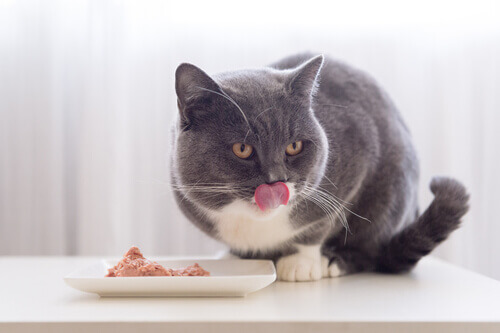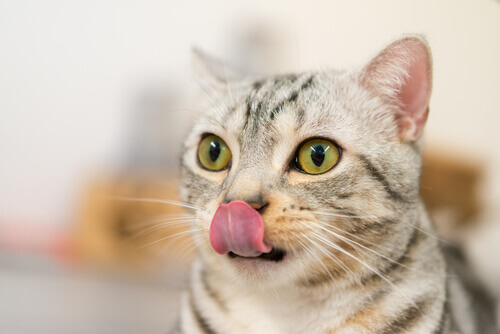A Good Meat Stew for Your Cat


Written and verified by the lawyer Francisco María García
The best option when feeding our pets is balanced food. But, from time to time, it’s not a bad idea to reward our cats with a delicious homemade meat stew.
Cats are basically carnivorous animals. A good plate of meat stew provides them with the proteins they need to give a boost to their health. Of course, before starting to prepare it, it’s advisable to consult the vet.
Cat food recipes are simple, inexpensive and easy to prepare. In addition, you can store these in the fridge for several days, and even freeze them for later.

Meat stew recipes for your cat
Meat and vegetable stew
Ingredients:
- Beef, chicken or fish – ½ kg (1 lb)
- Chopped vegetables (pumpkin, carrot, beet) – ½ kg (1 lb)
- Spinach – 1 small bunch
- Cooked brown rice – 2 cups
- Olive oil
Preparation:
- To start preparing this meat stew, place the diced vegetables in a frying pan with a drizzle of oil.
- Sauté everything for a few moments and transfer to a saucepan.
- Add the chopped spinach and cover everything with water.
- Then, add the rice, and the meat cut in small pieces.
- We don’t recommend using salt.
- Cook on low heat until the vegetables are tender. Lastly, remove from heat and season with a drizzle of oil.
- Store in the fridge. This can be kept for approximately four days, but it’s not advisable to freeze this stew.
Tasty chicken giblet stew
Ingredients:
- Chicken giblets (livers, hearts, etc.) – 1 kg (2 lb)
- Rice – 2 cups
- Chicken broth – 1 liter
- Grated carrots – 150 g (6 oz)
Preparation:
- This chicken meat stew will be a delight for your cat. To start preparing it, wash the chicken giblets.
- Then, dry the giblets with kitchen paper. Next, heat a frying pan with a little oil and brown the giblets very well on both sides.
- Meanwhile, place the chicken broth in a saucepan. Once the giblets are browned, add them to the pan along with the rice and carrots.
- Let it cook on a low heat until it absorbs all the liquid. Stir from time to time so the rice doesn’t stick. Finally, remove from the heat and let it cool. It can be stored in the fridge for five days.
Raw beef stew
This is a special meat stew recipe for cats that doesn’t require cooking because it’s served raw. Therefore, it’s better not to give it to cats with chronic kidney problems.
Ingredients:
- Chicken, beef or rabbit meat – 1 kg (2 lb)
- Chicken or beef hearts – 400 g (1 lb)
- Veal liver – 200 g (8 oz)
- Egg whites – 4
- Water as needed
- Olive oil (better with a fish flavor)
- Fine salt – 1/2 tsp
Preparation:
- If the meat is chicken remove half of the skin. If it’s beef, trim the fat. Cut into medium pieces and set aside.
- Next, grind the heart, the skin or fat and the liver, and add water if necessary. Set aside in the fridge.
- Separately, place 2 cups of water in a bowl and mix the rest of the ingredients: vitamins, oil supplements and salt.
- Lastly, incorporate the meat and the minced offal. Stir to integrate well; divide into portions and put in the freezer. You can add a pinch of salt to enhance the flavor of the ingredients.
- To serve, defrost 24 hours before, and warm the mix so that it’s not so cold.

Cats’ nutritional requirements
An adult cat needs food containing 85% meat, including offal, skin and bones. The remaining 15% should be made up of vegetables and fiber. So, the above meat stew recipes have been designed according to these requirements.
The cat should have enough fresh clean water to drink. Furthermore, the food can be served once a day, and the cat can eat it as often as it wishes. Alternatively, it can be divided into small portions throughout the day.
Finally, a cat accustomed to eating balanced food may reject homemade food even if it smells very good. To avoid this, you should introduce new food gradually until the cat accepts it completely.
The best option when feeding our pets is balanced food. But, from time to time, it’s not a bad idea to reward our cats with a delicious homemade meat stew.
Cats are basically carnivorous animals. A good plate of meat stew provides them with the proteins they need to give a boost to their health. Of course, before starting to prepare it, it’s advisable to consult the vet.
Cat food recipes are simple, inexpensive and easy to prepare. In addition, you can store these in the fridge for several days, and even freeze them for later.

Meat stew recipes for your cat
Meat and vegetable stew
Ingredients:
- Beef, chicken or fish – ½ kg (1 lb)
- Chopped vegetables (pumpkin, carrot, beet) – ½ kg (1 lb)
- Spinach – 1 small bunch
- Cooked brown rice – 2 cups
- Olive oil
Preparation:
- To start preparing this meat stew, place the diced vegetables in a frying pan with a drizzle of oil.
- Sauté everything for a few moments and transfer to a saucepan.
- Add the chopped spinach and cover everything with water.
- Then, add the rice, and the meat cut in small pieces.
- We don’t recommend using salt.
- Cook on low heat until the vegetables are tender. Lastly, remove from heat and season with a drizzle of oil.
- Store in the fridge. This can be kept for approximately four days, but it’s not advisable to freeze this stew.
Tasty chicken giblet stew
Ingredients:
- Chicken giblets (livers, hearts, etc.) – 1 kg (2 lb)
- Rice – 2 cups
- Chicken broth – 1 liter
- Grated carrots – 150 g (6 oz)
Preparation:
- This chicken meat stew will be a delight for your cat. To start preparing it, wash the chicken giblets.
- Then, dry the giblets with kitchen paper. Next, heat a frying pan with a little oil and brown the giblets very well on both sides.
- Meanwhile, place the chicken broth in a saucepan. Once the giblets are browned, add them to the pan along with the rice and carrots.
- Let it cook on a low heat until it absorbs all the liquid. Stir from time to time so the rice doesn’t stick. Finally, remove from the heat and let it cool. It can be stored in the fridge for five days.
Raw beef stew
This is a special meat stew recipe for cats that doesn’t require cooking because it’s served raw. Therefore, it’s better not to give it to cats with chronic kidney problems.
Ingredients:
- Chicken, beef or rabbit meat – 1 kg (2 lb)
- Chicken or beef hearts – 400 g (1 lb)
- Veal liver – 200 g (8 oz)
- Egg whites – 4
- Water as needed
- Olive oil (better with a fish flavor)
- Fine salt – 1/2 tsp
Preparation:
- If the meat is chicken remove half of the skin. If it’s beef, trim the fat. Cut into medium pieces and set aside.
- Next, grind the heart, the skin or fat and the liver, and add water if necessary. Set aside in the fridge.
- Separately, place 2 cups of water in a bowl and mix the rest of the ingredients: vitamins, oil supplements and salt.
- Lastly, incorporate the meat and the minced offal. Stir to integrate well; divide into portions and put in the freezer. You can add a pinch of salt to enhance the flavor of the ingredients.
- To serve, defrost 24 hours before, and warm the mix so that it’s not so cold.

Cats’ nutritional requirements
An adult cat needs food containing 85% meat, including offal, skin and bones. The remaining 15% should be made up of vegetables and fiber. So, the above meat stew recipes have been designed according to these requirements.
The cat should have enough fresh clean water to drink. Furthermore, the food can be served once a day, and the cat can eat it as often as it wishes. Alternatively, it can be divided into small portions throughout the day.
Finally, a cat accustomed to eating balanced food may reject homemade food even if it smells very good. To avoid this, you should introduce new food gradually until the cat accepts it completely.
All cited sources were thoroughly reviewed by our team to ensure their quality, reliability, currency, and validity. The bibliography of this article was considered reliable and of academic or scientific accuracy.
- Fredriksson-Ahomaa, M., Heikkilä, T., Pernu, N., Kovanen, S., Hielm-Björkman, A., & Kivistö, R. (2017). Raw meat-based diets in dogs and cats. Veterinary sciences, 4(3), 33.
- Chan, S. K., & Leung, D. Y. (2018). Dog and cat allergies: current state of diagnostic approaches and challenges. Allergy, Asthma & Immunology Research, 10(2), 97-105.
- Guilford, W. G., Jones, B. R., Markwell, P. J., Arthur, D. G., Collett, M. G., & Harte, J. G. (2001). Food sensitivity in cats with chronic idiopathic gastrointestinal problems. Journal of Veterinary Internal Medicine, 15(1), 7-13.
- Loureiro, B. A., Sakomura, N. K., Vasconcellos, R. S., Sembenelli, G., Gomes, M. D. O. S., Monti, M., … & Carciofi, A. C. (2017). Insoluble fibres, satiety and food intake in cats fed kibble diets. Journal of animal physiology and animal nutrition, 101(5), 824-834.
This text is provided for informational purposes only and does not replace consultation with a professional. If in doubt, consult your specialist.








